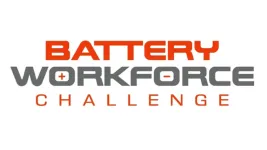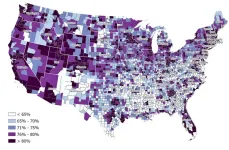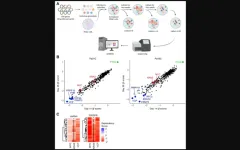(Press-News.org) A mining technology pioneered by researchers at the Bureau of Economic Geology at The University of Texas at Austin could reduce the amount of energy needed to access critical minerals vital for modern energy technologies and capture greenhouse gases along the way.
Transitioning the world’s energy to technologies and sources with low-carbon emissions will take, in part, tremendous amounts of lithium, nickel, cobalt and other critical minerals that exist in low concentrations in the Earth’s crust. Mining those elements takes much energy and produces waste, which can negatively affect the environment and create significant amounts of greenhouse gas emissions such as carbon dioxide (CO2).
This research could turn these emissions into a tool by using CO2 to weaken the rock containing critical minerals, reducing the amount of energy needed for mining. The ultimate goal is to significantly reduce the emissions produced during mining by storing them safely in the rocks, and potentially even make mining carbon negative – storing more carbon than is produced – by piping in and storing CO2 emissions from other industrial operations.
This CO2 storage is possible because of the way ultramafic rocks, which typically contain critical minerals, react with carbon. The CO2 chemically reacts with the rock to mechanically break its structure, making the minerals easier and less energy intensive to mine. This reaction also partially turns the rock into a limestone, incorporating the carbon dioxide into the mineral structure and storing it permanently.
“Mining processes create a lot of CO2 as a byproduct,” said Estibalitz Ukar, a research scientist at the Bureau of Economic Geology at the UT Jackson School of Geosciences. “If you can capture what is produced at the mine, then you can come up with a low-emission operation, which is good, but we want to use the CO2-reducing properties of ultramafic rocks to help eliminate even more CO2.”
Ukar is leading a team of scientists that is working to perfect the mining technology, which is supported by a $5 million grant from the U.S. Department of Energy Advanced Research Projects Agency-Energy. The three-year project will work to refine the mining method in the lab for two years before trying a full-scale field test in partnership with Canada Nickel Company. The field test is planned to take place in one of 20 newly discovered ore bodies near the U.S.-Canada border that are forecast to be an important new source of critical minerals in North America.
The project would also make low-grade deposits more economically viable, an important step in increasing the available supply of domestically produced critical minerals.
“The demand is high now, but we will see a huge increase in the next three to five years as we transition into lower-emission technologies, such as electric vehicles,” Ukar said. “We need to meet the demand by finding creative ways to reduce costs and emissions, find new sources of metals, and make the mines of the future more sustainable. And we need to do it fast.”
The project is part of the Mining Innovations for Negative Emissions Resource Recovery program, a new initiative that aims to develop market-ready technologies that will increase domestic supplies of critical elements required for the transition to low-carbon or carbon-free energy.
The research brings together the expertise of scientists from the Bureau of Economic Geology and Department of Geological Sciences in the UT Jackson School, as well as researchers from the UT departments of Petroleum & Geosystems Engineering and Aerospace Engineering & Engineering Mechanics; Columbia University; the University of Bern; and Carbfix, an Iceland-based project using a similar method to store CO2 in basalt.
Several groups from the Bureau of Economic Geology are a part of the project. These include the Gulf Coast Carbon Center, a world leader in monitoring carbon to make sure it is safely stored. Experts from the bureau’s TexNet seismic monitoring system are also part of the team, and will help determine if the new mining method causes any seismic activity.
“Lowering the emissions from energy, in an affordable and reliable way so that the global population can afford it, is the great challenge,” said Bureau of Economic Geology Director Scott Tinker. “This research program, if successful, could be one of several approaches to help advance that effort. The integrated team is critical to success.”
In addition to the MINER support, Ukar has received a separate $1 million grant from the DOE’s National Energy Technology Laboratory to find places within the U.S. where this new mining technology could be applied. If successful, the technology could be useful in mining operations globally.
Read Q and A with Ukar.
END
New mining technology uses CO2 as tool to access critical minerals
The University of Texas at Austin is leading a Department of Energy project to make the mining of critical minerals carbon-free
2023-03-24
ELSE PRESS RELEASES FROM THIS DATE:
Wastewater to energy: new treatment process can improve biorefinery sustainability
2023-03-24
Wastewater from biorefineries that convert plants into fuel is full of organic materials that cannot be efficiently treated with conventional wastewater systems, making it costly and energy-intensive to manage.
However, those rich organic materials are an untapped source of chemical energy that can be recovered as valuable products, including biogas, a clean-burning renewable fuel.
A study by researchers at the Department of Energy’s Center for Advanced Bioenergy and Bioproducts Innovation (CABBI) found that recovering resources from wastewater can substantially improve the economic and environmental sustainability of second-generation ...
U.S. Department of Energy and Stellantis announce the Battery Workforce Challenge
2023-03-24
The U.S. Department of Energy (DOE) and Stellantis today announced the launch of the Battery Workforce Challenge, which includes a three-year collegiate engineering competition; vocational training; youth education in science, technology, engineering and math (STEM); and career and technical education.
DOE has set a bold target to address the climate crisis and puts our nation on a path to achieve net-zero emissions, economy-wide, by 2050 for the benefit of all Americans. Key to this target goal are the design and development of advanced batteries to electrify ...
Study finds higher risk of sleep problems in gay, lesbian, and bisexual youth
2023-03-24
Toronto, ON - A new national study, published in LGBT Health, finds that lesbian, gay, and bisexual (LGB) youth are twice as likely to report trouble falling or staying asleep than their straight peers. Greater depression, stress, and family conflict contribute to the sleep problems of LGB youth.
“Young people who identify as lesbian, gay, or bisexual may face discrimination and negative attitudes because of their sexual orientation. These experiences can make it harder for them to get a good night’s sleep,” says lead author, Jason Nagata, MD, assistant professor of pediatrics at the University of California, San Francisco. “Difficulties getting ...
UW researchers identify cell type that could be key to preventing marrow transplant complication
2023-03-24
A bone marrow transplant can be a lifesaving treatment for people with relapsed blood cancers, but a potentially lethal complication known as graft-versus-host disease put limitations on this procedure. New research from the University of Wisconsin–Madison is helping to change that by identifying the cell population that causes GVHD, a target that may make bone marrow transplants safer and more effective.
An allogenic (from a donor) bone marrow transplant is a common treatment for blood cancers and other diseases of the immune system. During the transplant, the patient’s immune cells are replaced with the donor’s ...
Buprenorphine after nonfatal opioid overdose results in reduced risk of overdose death
2023-03-24
Receiving medication for opioid use disorders, such as buprenorphine after an overdose, leads to lower mortality risk, according to a Rutgers study.
Drug overdose deaths are a significant public health concern in the United States. According to the National Center for Health Statistics, there were more than 105,000 drug overdose deaths in 2021, which were largely attributed to opioids. Rutgers researchers found that opioid-involved overdose deaths following nonfatal overdose events are largely preventable with buprenorphine medication for opioid use disorder.
The medication, approved by the Food and Drug Administration, is a highly effective ...
Narrowing the digital divide for health care
2023-03-24
Many parts of rural America with less access to health care also have limited broadband internet that could help them take advantage of increasingly popular online health services.
A new study by the University of Cincinnati highlighted disparities in access to digital technology that could widen the gap in access to health care. The study found that socially vulnerable communities in the United States face more barriers to adequate health care, live in areas with fewer health care resources and have less access to high-speed internet.
UC researchers ...
Corporate investment could improve climate-tech innovation
2023-03-24
MADISON—Corporate investments in climate-tech start-ups are a growing but overlooked aspect of energy innovation. According to a new report from Morgan Edwards, a professor at the La Follette School of Public Affairs at the University of Wisconsin–Madison, and her lead co-author at University of Maryland, these investments should be more fully considered as methods to advance climate technology. The report was published in the journal Joule on March 17.
Start-up companies have the potential to rapidly commercialize innovation, but they don’t always have the resources to make such ventures successful. Corporations, on the other ...
Genes & Cancer | VCP/p97 as a therapeutic target in KRAS-mutant pancreatic cancer
2023-03-24
“In summary, our goal was to identify additional therapeutic targets for KRAS-driven PDAC.”
BUFFALO, NY- March 24, 2023 – A new research paper was published in Genes & Cancer on March 10, 2023, entitled, “VCP/p97, a pleiotropic protein regulator of the DNA damage response and proteostasis, is a potential therapeutic target in KRAS-mutant pancreatic cancer.”
Researchers have recently shown that proteins involved in the DNA damage response (DDR) are critical for KRAS-mutant pancreatic ductal ...
Finding the sweet spot in sugar reductions
2023-03-24
Putting less sugar in sodas and reducing the package size of sodas sold in supermarkets may help reduce our collective sugar intake and thus lower the associated health risks. Good news for consumers, but how does it affect manufacturers? Research conducted in the US has shown that marketing diet or sugar-free varieties does not lead to an increase in the overall turnover of soda manufacturers. This is because consumers tend to switch from sugary to sugar-free versions of the same brand. However, reducing the package size of soda does have a positive effect on the sales ...
New study about the ‘tsunami’ in Venus’s clouds
2023-03-24
A group of scientists from the University of Seville, in collaboration with experts from the University of the Basque Country, has led the first detailed study of the evolution of the discontinuity of Venus’s clouds, a gigantic atmosphere wave with the appearance of a “tsunami” that is propagated in the planet’s deepest clouds and which, it is believed, may be playing a very significant role in the acceleration of Venus’s fast-moving atmosphere. The observations were carried out non-stop for more than 100 days. “This observational ...
LAST 30 PRESS RELEASES:
Fossil amber reveals the secret lives of Cretaceous ants
Predicting extreme rainfall through novel spatial modeling
The Lancet: First-ever in-utero stem cell therapy for fetal spina bifida repair is safe, study finds
Nanoplastics can interact with Salmonella to affect food safety, study shows
Eric Moore, M.D., elected to Mayo Clinic Board of Trustees
NYU named “research powerhouse” in new analysis
New polymer materials may offer breakthrough solution for hard-to-remove PFAS in water
Biochar can either curb or boost greenhouse gas emissions depending on soil conditions, new study finds
Nanobiochar emerges as a next generation solution for cleaner water, healthier soils, and resilient ecosystems
Study finds more parents saying ‘No’ to vitamin K, putting babies’ brains at risk
Scientists develop new gut health measure that tracks disease
Rice gene discovery could cut fertiliser use while protecting yields
Jumping ‘DNA parasites’ linked to early stages of tumour formation
Ultra-sensitive CAR T cells provide potential strategy to treat solid tumors
Early Neanderthal-Human interbreeding was strongly sex biased
North American bird declines are widespread and accelerating in agricultural hotspots
Researchers recommend strategies for improved genetic privacy legislation
How birds achieve sweet success
More sensitive cell therapy may be a HIT against solid cancers
Scientists map how aging reshapes cells across the entire mammalian body
Hotspots of accelerated bird decline linked to agricultural activity
How ancient attraction shaped the human genome
NJIT faculty named Senior Members of the National Academy of Inventors
App aids substance use recovery in vulnerable populations
College students nationwide received lifesaving education on sudden cardiac death
Oak Ridge National Laboratory launches the Next-Generation Data Centers Institute
Improved short-term sea level change predictions with better AI training
UAlbany researchers develop new laser technique to test mRNA-based therapeutics
New water-treatment system removes nitrogen, phosphorus from farm tile drainage
Major Canadian study finds strong link between cannabis, anxiety and depression
[Press-News.org] New mining technology uses CO2 as tool to access critical mineralsThe University of Texas at Austin is leading a Department of Energy project to make the mining of critical minerals carbon-free



